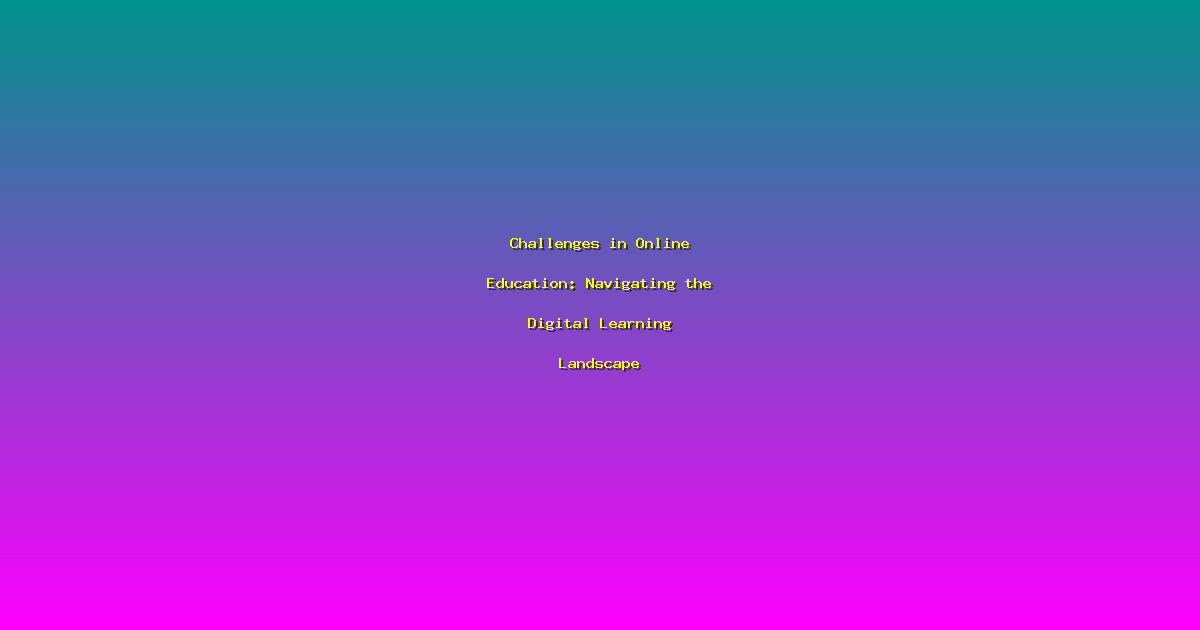Challenges in Online Education: Navigating the Digital Learning Landscape
Introduction
As the world continues to embrace digital transformation, online education has become an increasingly popular and necessary mode of learning. However, the shift from traditional classroom settings to virtual classrooms presents unique challenges that educators, students, and institutions must navigate. This article delves into the major obstacles encountered in online education and explores strategies to mitigate these challenges.
Technological Barriers and Infrastructure
One of the primary challenges in online education is the requirement for a reliable technological infrastructure. Students and educators must have access to stable internet connections and appropriate devices to participate effectively. In regions where such resources are sparse or unreliable, the digital divide can exacerbate educational inequities, making it difficult for students to engage fully with online courses.
Student Engagement and Motivation
Maintaining student engagement in an online environment is another significant challenge. The lack of face-to-face interaction can lead to feelings of isolation and disconnection, reducing the motivation to participate actively. Educators must implement innovative and interactive methods to keep students engaged, such as gamification, group projects, and regular communication channels.
Quality of Instruction and Curriculum Design
Ensuring the quality of instruction and the adaptability of curriculums to an online format are critical. Traditional teaching methods often need to be rethought for digital platforms to be effective. This includes creating content that is both informative and engaging, as well as incorporating interactive elements to enhance learning outcomes.
Support Systems for Students and Educators
The need for robust support systems to assist both students and educators cannot be overstated. Students require technical support to troubleshoot issues and emotional support to cope with the pressures of online learning. Educators need support in learning new digital tools and adapting their teaching methods to an online environment.
FAQs
Q: How can schools and universities improve internet access for their students?
Improvements can be made through partnerships with internet providers to offer discounted services, providing devices like laptops or tablets to those in need, and establishing community learning hubs with high-speed internet access.
Q: What are some effective methods to enhance student engagement in online classes?
Using multimedia content, interactive quizzes, live chat sessions, and regular feedback mechanisms can help maintain student engagement and participation.
Q: How can institutions provide better support for educators transitioning to online teaching?
Offering professional development workshops, access to online resources, and peer mentoring can equip educators with the skills needed for effective online teaching.
Q: What are the main challenges in designing curriculum for online education?
Adapting material to be engaging and interactive, ensuring accessibility for all learners, and maintaining the quality and depth of content are key challenges in curriculum design for online education.
Q: How can we assess student performance effectively in online education?
Implementing a mix of formative and summative assessments, using tools like online quizzes, peer evaluations, and project-based assessments can help in effective performance evaluation.
Conclusion and Call-to-Action
While online education offers unprecedented opportunities for learning, it also comes with its set of challenges. It is crucial for educational institutions, policymakers, and technology providers to work collaboratively to address these challenges. By focusing on improving technological infrastructure, enhancing teaching and learning methodologies, and providing robust support systems, we can ensure that online education becomes a more effective and inclusive mode of learning.
Join us in our mission to enhance the quality of online education. Learn more about our initiatives and how you can contribute to bridging the digital learning gap.

